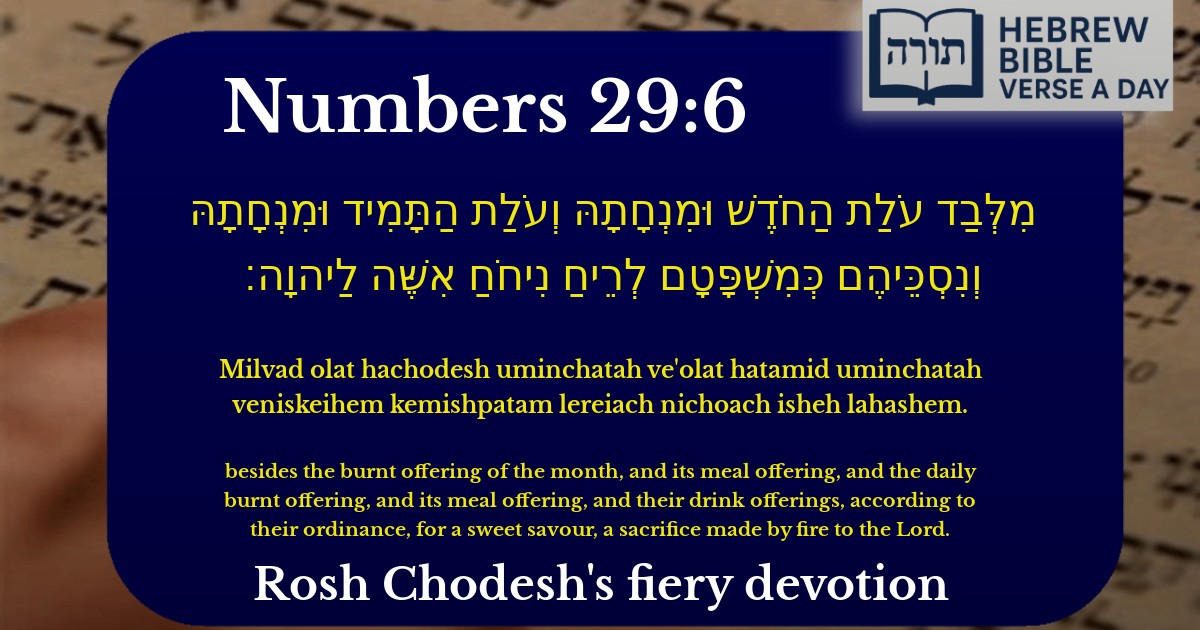Join Our Newsletter To Be Informed When New Videos Are Posted
Join the thousands of fellow Studends who rely on our videos to learn how to read the bible in Hebrew for free!
Hebrew Text
מִלְּבַד עֹלַת הַחֹדֶשׁ וּמִנְחָתָהּ וְעֹלַת הַתָּמִיד וּמִנְחָתָהּ וְנִסְכֵּיהֶם כְּמִשְׁפָּטָם לְרֵיחַ נִיחֹחַ אִשֶּׁה לַיהוָה׃
English Translation
besides the burnt offering of the month, and its meal offering, and the daily burnt offering, and its meal offering, and their drink offerings, according to their ordinance, for a sweet savour, a sacrifice made by fire to the Lord.
Transliteration
Milvad olat hachodesh uminchatah ve'olat hatamid uminchatah veniskeihem kemishpatam lereiach nichoach isheh lahashem.
Hebrew Leining Text
מִלְּבַד֩ עֹלַ֨ת הַחֹ֜דֶשׁ וּמִנְחָתָ֗הּ וְעֹלַ֤ת הַתָּמִיד֙ וּמִנְחָתָ֔הּ וְנִסְכֵּיהֶ֖ם כְּמִשְׁפָּטָ֑ם לְרֵ֣יחַ נִיחֹ֔חַ אִשֶּׁ֖ה לַיהֹוָֽה׃ <span class="mam-spi-samekh">{ס}</span>
מִלְּבַד֩ עֹלַ֨ת הַחֹ֜דֶשׁ וּמִנְחָתָ֗הּ וְעֹלַ֤ת הַתָּמִיד֙ וּמִנְחָתָ֔הּ וְנִסְכֵּיהֶ֖ם כְּמִשְׁפָּטָ֑ם לְרֵ֣יחַ נִיחֹ֔חַ אִשֶּׁ֖ה לַיהֹוָֽה׃ {ס}
🎵 Listen to leining
Parasha Commentary
📚 Talmud Citations
This verse is not quoted in the Talmud.


Overview of the Verse
The verse (Numbers 28:15) discusses additional offerings brought on Rosh Chodesh (the beginning of the month) alongside the daily Korban Tamid (continual burnt offering). It emphasizes that these offerings must be brought "כְּמִשְׁפָּטָם" ("according to their ordinance")—following the precise halachic requirements—and describes them as "רֵיחַ נִיחֹחַ אִשֶּׁה לַיהוָה" ("a sweet savor, a fire-offering to the Lord").
Commentary from Rashi
Rashi explains that the phrase "מִלְּבַד עֹלַת הַחֹדֶשׁ" ("besides the burnt offering of the month") teaches that the Korban Musaf (additional offering) of Rosh Chodesh is separate from the Korban Tamid. He further notes that the repetition of "וּמִנְחָתָהּ" ("and its meal offering") emphasizes that each animal sacrifice (the burnt offering of the month and the daily offering) requires its own accompanying mincha (flour offering).
Halachic Insights from Rambam
Rambam (Hilchot Temidin u'Musafin 1:1-3) elaborates on the structure of these offerings, stating that the Korban Tamid is brought every day without exception, while the Musaf of Rosh Chodesh is an additional obligation. The verse underscores that even when multiple offerings coincide, each must be performed according to its proper mishpat (law).
Symbolism in the Midrash
The Midrash (Bamidbar Rabbah 21:10) connects the phrase "רֵיחַ נִיחֹחַ" ("a sweet savor") to the idea that these offerings bring spiritual satisfaction to Hashem when performed with proper intent. The nesachim (drink offerings) accompanying the sacrifices symbolize the Jewish people's complete devotion, as wine represents joy and wholehearted service.
Key Teachings from the Talmud